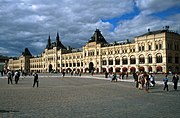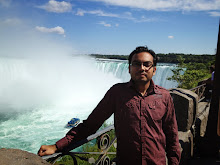

Moscow is one of largest city economies in Europe and it comprises approximately 20% of Russian GDP. As of 2007 Moscow economy reached 6.73 trl roubles [75] ($263 bln or $426bln PPP adjusted [76]).
In 2006, Mercer Human Resources Consulting named Moscow the world's most expensive city for expatriate employees, ahead of perennial winner Tokyo, due to the stable Russian ruble as well as increasing housing prices within the city.[77] Moscow also ranked first in the 2007 edition and 2008 edition of the survey. However, Tokyo has overtaken Moscow as the most expensive city in the world, placing Moscow at third and behind Osaka at second.[8]
A significant portion of Russia's profits and development is concentrated in Moscow as many multi-national corporations have branches and offices in the city. The plush offices and the lifestyles of the typical corporate employee in Moscow are often indistinguishable from any Western European city, although the average salary for the Muscovite is a bit lower.[78] Since the 1998 Russian financial crisis, various business sectors in Moscow have shown exponential rates of growth. Many new business centres and office buildings have been built in recent years, but Moscow still experiences shortages in office space. As a result, many former industrial and research facilities are being reconstructed to become suitable for office use.

However, while the overall stability has improved in the recent years, crime and corruption continue to remain a problem hindering business development.

The Cherkizovskiy marketplace is the largest marketplace in Europe with daily turnover of about thirty million dollars and about ten thousand sellers[79] from different countries (including China, Turkey, Azerbaijan and India). It is administratively divided into twelve parts and covers a wide sector of the city.It is closed from 1st of July 2009.
In 2008, Moscow had 74 billionaires with average wealth of $5.9 billion, which placed it above New York's 71 billionaires. However, in 2009, there are only 27 billionaires in Moscow compared with New York's 55 billionaires. Overall, Russia lost 52 billionaires during the recession List of Russian billionaires by net worth [80]. Topping the list of Russia's billionaires in 2009 is Mikhail Prokhorov with $9,5 billion, ahead of the more famous Roman Abramovich with $8.5 billion, in 2nd place. Prokhorov's holding company, "ОНЭКСИМ" group, owns huge assets in hidrogenium energy, nanotechnology, traditional energy, precious metals sector, while Abramovich, since selling his oil company Sibneft to Russian state-controlled gas giant Gazprom in 2005, has bought up steel and mining assets. He also owns Chelsea F.C.. Russia's richest woman remains Yelena Baturina, the 45-year-old second wife of Moscow Mayor Yuri Luzhkov. Oleg Deripaska, the 1st of this list in 2008 with $28 billion, in 2009 is only 10th with $3.5 billion.
The nouveau riche, also called the "New Russians", often pejoratively, have a reputation for flaunting their wealth; the avenues for doing so, and subtly, have also increased in recent times — a sense of fashion and self-consciousness has instilled itself through the many haute couture and haute cuisine spots in Moscow.
Industry
Primary industries in Moscow include the chemical, metallurgy, food, textile, furniture, energy production, software development and machinery industries.

The Mil Moscow Helicopter Plant is one of the leading producers of military and civil helicopters in the world. Khrunichev State Research and Production Space Center produces various space equipment, including modules for space stations Mir, Salyut and the ISS as well as Proton launch vehicles and military ICBMs. Sukhoi, Ilyushin, Mikoyan, Tupolev and Yakovlev aircraft design bureaus also situated in Moscow. Automobile plants ZiL and AZLK, as well as the Voitovich Rail Vehicle plant, are situated in Moscow and Metrovagonmash metro wagon plant is located just outside the city limits. The Poljot Moscow watch factory produces reliable military, professional and sport watches well known in Russia and abroad. Yuri Gagarin in his trip into space used "Shturmanskie", produced by this factory. The Electrozavod factory was the first transformer factory in Russia. The Kristall distillery[81] is the oldest distillery in Russia producing various vodka types, including "Stolichnaya" while a wide assortment of wines are produced at several Moscow wine plants, including Moscow Interrepublican Vinery.[82] The Moscow Jewelry Factory[83] and the Jewellerprom[84] are important producers of jewellery in Russia; Jewellerprom used to produce the famous and exclusive Order of Victory, awarded to those aiding the Soviet Union's Red Army during World War II. There are also many other industries located just outside the city of Moscow, as well as many microelectronic industries in Zelenograd.
Gazprom, the largest extractor of natural gas in the world and the largest Russian company, has head office also in Moscow, as well as many other oil, gas and electricity companies.


Moscow also hosts headquarters of various software development companies, including such as:
- 1C Company – business software and games producer
- ABBYY software house – developer of text recognition and translation software,
- Akella – game developer company
- Kaspersky Lab – worldwide-known producer of anti-virus software,
Despite the economic growth experienced in Moscow since the dawn of the twenty-first century, many industries have undergone various crises in recent years. Some of them have been sold to foreign investors, such as OTIS and British American Tobacco, and others have been closed down to make room for new buildings constructed as business centres.
Additionally, some industry is now being transferred out of Moscow to improve the ecological state of the city. Nevertheless, the city of Moscow remains one of Russia's major industrial centres.
Living costs



During Soviet times, apartments were lent to people by the government according to the square meters-per-person norm (some groups, including people's artists, heroes and prominent scientists had bonuses according to their honors). Private ownership of apartments was limited until the 1990s, when people were permitted to secure property rights to the places they inhabited. Since the Soviet era, estate owners have had to pay the service charge for their residences, a fixed amount based on persons per living area.
Due to the current economic situation, the price of real estate in Moscow continues to rise. Today, one could expect to pay US$4000 in average per square meter (11 sq ft) in the outskirts of the city[85] or US$6,500–$8,000 per square meter in a prestigious district. The price sometimes may exceed US$40,000 per square meter in a flat.[86][87][88] It costs about US$2500 per month to rent a 1-bedroom apartment and about US$1500 per month for a studio in the center of Moscow.
A typical one-bedroom apartment is about thirty square meters (323 sq ft), a typical two-bedroom apartment is forty-five square meters (485 sq ft), and a typical three-bedroom apartment is seventy square meters (753 sq ft). Many cannot move out of their apartments, especially if a family lives in a two-room apartment originally granted by the state during the Soviet era. Some city residents have attempted to cope with the cost of living by renting their apartments while staying in dachas (country houses) outside the city.
In 2008, Moscow ranked top on the list of most expensive cities for the third year in a row.[89]
As of 2006, there are 8.47 million Muscovites able to work. 1.73 million are employed by the state, 4.42 million are employed by private companies, and 1.99 million are employed by small businesses. There are 74,400 officially registered unemployed working age, of which 34,400 are eligible for unemployment benefits.[45]
Future development

The "Moscow International Business Center" (Moscow-City) is a projected new part of central Moscow. Geographically situated in Presnensky District, located at the Third Ring, the Moscow-City area is under intense development.


The goal of MIBC "Moscow-City" is to create a zone, the first in Russia, and in all of Eastern Europe,[90] that will combine business activity, living space and entertainment. It will be a city within a city. The project was conceived by the Moscow government in 1992.
The construction of MIBC "Moscow-City" takes place on the Krasnopresnenskaya embankment. The whole project takes up 1 square kilometer (247 acres). This area is the only spot in downtown Moscow that can accommodate a project of this magnitude. Today, most of the buildings there are old factories and industrial complexes.
The Federation Tower, now being built is to be completed in 2009, will become the tallest building in Europe when completed.
At overall completion the plan is to have one of the tallest buildings in the world; the Russia Tower is planned to be completed by 2012 at a height of 612,2 meters (2009 ft), second only to the Burj Khalifa.[91] Also to be included in the project are a waterpark and other recreational facilities; trade and entertainment complexes, numerous prestigious office and residential buildings, the transport node and the new site of the Moscow government. The construction of four new metro stations in the territory has already been completed, of which two have already opened and two others are reserved for future metro lines crossing MIBC, some additional stations were planned. A rail shuttle service, directly connecting MIBC with the Sheremetyevo International Airport is also planned.
A Fourth Ring freeway (in addition to Moscow Automobile Ring Road, Garden Ring and the Third Ring) has been designed and is being built around Moscow. It is to be completed by 2012 and will have total length of 61 kilometers (38 mi).[92][93][94]
In March 2009 the Russian business newspaper "Kommersant"[95][96][97][98] reported that because of the Worldwide Economic Crisis, which started in 2008 and spread globally, many of the construction projects in Moscow (especially in the "Moscow International Business Center") are frozen and may be cancelled altogether—like the ambitious "Russia Tower" in "Moscow-city". Many of yesterday's monstrous development groups is now in near-bankrupt state like—Mirax-group or AFI Development.

